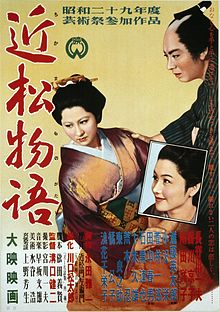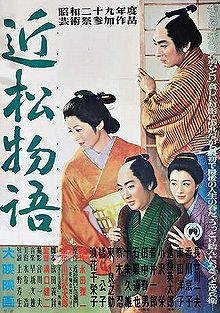- The Crucified Lovers
-
The Crucified Lovers 
Original Japanese movie posterDirected by Kenji Mizoguchi Produced by Masaichi Nagata Written by Yoshitaka Yoda
Matsutarō Kawaguchi
Chikamatsu Monzaemon (story)Starring Kazuo Hasegawa
Kyoko Kagawa
Yōko Minamida
Eitaro ShindoMusic by Fumio Hayasaka
Tamezō MochizukiCinematography Kazuo Miyagawa Editing by Kanji Sugawara Distributed by Daiei Release date(s)  November 23, 1954
November 23, 1954Running time 102 min. Country Japan Language Japanese The Crucified Lovers (近松物語 Chikamatsu Monogatari, literally, "A Story From Chikamatsu") is a 1954 black-and-white Japanese film directed by Kenji Mizoguchi. It was adapted from Monzaemon Chikamatsu's 17th century play Daikyoji sekireki (大経師昔暦), hence the title.
Contents
Synopsis
Ishun (Shindo) is a wealthy but miserly scroll-maker in Kyoto, especially regarding his younger wife Osan (Kagawa), who was from an impoverished family, and married Ishun for money.
When Osan's brother asks for a loan, he is refused. Osan then seeks help from Mohei (Hasegawa) - one of Ishun's top apprentices, who forges a receipt in an attempt at obtaining the money from Ishun, but is caught. Ishun threatens to summon the authorities, but a maid (Minamida) asks him to forgive the act, claiming that she had asked for the money. Ishun has made advances toward the maid, who has refused him. Ishun then assumes the maid (who is secretly in love with Mohei) is sleeping with Mohei, and Ishun orders Mohei locked up in the attic.
When Osan thanks the maid for attempting to help, she discovers her husband's attempted infidelities. Hoping to confront him, she sleeps in the maid's room that night. To her surprise, Mohei, who has escaped, sneaks into the room, in an attempt as saying goodbye to the maid before fleeing. Osan attempts to persuade Mohei into staying, but the two are interrupted when the shop clerk enters the room, and immediately assumes the two to be having an affair.
Mohei is chased away, and Ishun - after being alerted to the incident - concludes that his wife is having an affair. Angered and insulted, Osan leaves the house, only to again encounter Mohei. They later discover that Ishun has alerted the police, and Mohei is now wanted for forgery and adultery (a capital offense). Rather than face such unjust accusations the two decide to commit suicide together. They change their minds, however, when Mohei confesses his love for Osan.
They continue to flee on foot, their now mutual love growing, while Ishun's men and the police continue to pursue them. They reach the home of Mohei's father where he reluctantly gives them food and shelter. By this time a traveling chestnut salesman has inadvertently notified Ishun's house of the whereabouts of the two lovers. Ishun's men arrive at Mohei's father's where the two are captured. Mohei is bound and left for the police to find the next day while Osan is taken to her family home en route to Ishun.
As Osan refuses to return to Ishun's house, Mohei arrives at her family home, having been freed by his father. Osan's mother tries to convince Mohei to turn himself in while her brother goes to fetch Ishun and his men. Just as Ishun arrives, the lovers escape one last time. In the film's final sequence it is revealed Mohei and Osan have turned themselves into the police and confessed to adultery. As Ishun did not report his wife's misdeeds, only Mohei's forgery, he has been found guilty of deceiving the authorities and - as Osan and Mohei are paraded through the streets en route to their crucifixion – all Ishun's property and wealth are being seized. The other servants watch the parade and note that Mohei and Osan look happier than ever before.
Cast
- Kazuo Hasegawa - Mohei
- Kyôko Kagawa - Osan
- Eitarô Shindô - Ishun
- Eitarô Ozawa - Sukeemon (as Saka Ozawa)
- Yōko Minamida - Otama
- Haruo Tanaka - Gifuya Dôki
- Chieko Naniwa - Okô
- Ichirô Sugai - Gembei
- Tatsuya Ishiguro - Isan
- Hiroshi Mizuno - Kuroki
- Hisao Toake - Morinokoji
- Ikkei Tamaki - Jushiro Umegaki
- Kimiko Tachebana - Umetatsu Akamatsu
- Keiko Koyanagi - Okaya
- Sayako Nakagami - Osono
Impact
Nominated for the Palme d'Or at the 1955 Cannes Film Festival,[1] The Crucified Lovers was one of several of late-career films (Life Of Oharu, Ugetsu, Sansho the Bailiff) that brought Mizoguchi to the attention of non-Japanese audiences.
Photographed by Kazuo Miyagawa (Rashomon, Floating Weeds, Tokyo Olympiad), The Crucified Lovers features Mizoguchi's sequence shot aesthetic, recalling Japanese woodcuts and scroll paintings.
References
- ^ "Festival de Cannes: The Crucified Lovers". festival-cannes.com. http://www.festival-cannes.com/en/archives/ficheFilm/id/3751/year/1955.html. Retrieved 2009-01-31.
External links
- The Crucified Lovers at the Internet Movie Database
- (Japanese) The Crucified Lovers at the Japanese Movie Database
The films of Kenji Mizoguchi 1920s The Song of Home (1929) • Tokyo March (1929)1930s The Water Magician (1933) • Gion Festival (1933) • The Mountain Pass of Love and Hate (1934) • The Downfall of Osen (1935) • Oyuki, the Madonna (1935) • Poppies (1936) • Osaka Elegy (1936) • Sisters of the Gion (1936) • The Straits of Love and Hate (1937) • The Story of the Last Chrysanthemums (1939)1940s A Woman of Osaka (1940) • The Life of an Actor (1941) • The 47 Ronin (1941) • Miyamoto Musashi (1944) • The Famous Sword Bijomaru (1945) • The Victory of Women (1946) • Utamaro and His Five Women (1947) • The Love of the Actress Sumako (1947) • Women of the Night (1948) • Flame of My Love (1949)1950s Portrait of Madame Yuki (1950) • Miss Oyu (1951) • The Lady of Musashino (1951) • The Life of Oharu (1952) • Ugetsu (1953) • A Geisha (1953) • Sansho the Bailiff (1954) • The Woman in the Rumor (1954) • The Crucified Lovers (1954) • Princess Yang Kwei-Fei (1955) • Tales of the Taira Clan (1955) • Street of Shame (1956)Cinema of Japan Actors · Awards · Directors (list) · Cinematographers · Composers · Editors · Festivals · Producers · ScreenwritersGenres Gendai-geki · Jidaigeki · Pink film · Samurai cinema · Shomin-geki · Tendency film · Yakuza film (Gokudō)Films
 3-D films · Silent films · Short films · Television films · Films by directorFilms by genreAction · Anime · Comedy · Documentary · Drama · Horror · Jidaigeki · Mystery · Pink · Romance · Science fiction · Tokusatsu · Yakuza1898–1919 · 1920s · 1930s · 1940s · 1950 · 1951 · 1952 · 1953 · 1954 · 1955 · 1956 · 1957 · 1958 · 1959 · 1960 · 1961 · 1962 · 1963 · 1964 · 1965 · 1966 · 1967 · 1968 · 1969 · 1970 · 1971 · 1972 · 1973 · 1974 · 1975 · 1976 · 1977 · 1978 · 1979 · 1980 · 1981 · 1982 · 1983 · 1984 · 1985 · 1986 · 1987 · 1988 · 1989 · 1990 · 1991 · 1992 · 1993 · 1994 · 1995 · 1996 · 1997 · 1998 · 1999 · 2000 · 2001 · 2002 · 2003 · 2004 · 2005 · 2006 · 2007 · 2008 · 2009 · 2010 · 2011 · 2012
3-D films · Silent films · Short films · Television films · Films by directorFilms by genreAction · Anime · Comedy · Documentary · Drama · Horror · Jidaigeki · Mystery · Pink · Romance · Science fiction · Tokusatsu · Yakuza1898–1919 · 1920s · 1930s · 1940s · 1950 · 1951 · 1952 · 1953 · 1954 · 1955 · 1956 · 1957 · 1958 · 1959 · 1960 · 1961 · 1962 · 1963 · 1964 · 1965 · 1966 · 1967 · 1968 · 1969 · 1970 · 1971 · 1972 · 1973 · 1974 · 1975 · 1976 · 1977 · 1978 · 1979 · 1980 · 1981 · 1982 · 1983 · 1984 · 1985 · 1986 · 1987 · 1988 · 1989 · 1990 · 1991 · 1992 · 1993 · 1994 · 1995 · 1996 · 1997 · 1998 · 1999 · 2000 · 2001 · 2002 · 2003 · 2004 · 2005 · 2006 · 2007 · 2008 · 2009 · 2010 · 2011 · 2012Other Categories:- Japanese films
- Japanese-language films
- 1954 films
- 1950s drama films
- Black-and-white films
- Films directed by Kenji Mizoguchi
- Daiei films
Wikimedia Foundation. 2010.


